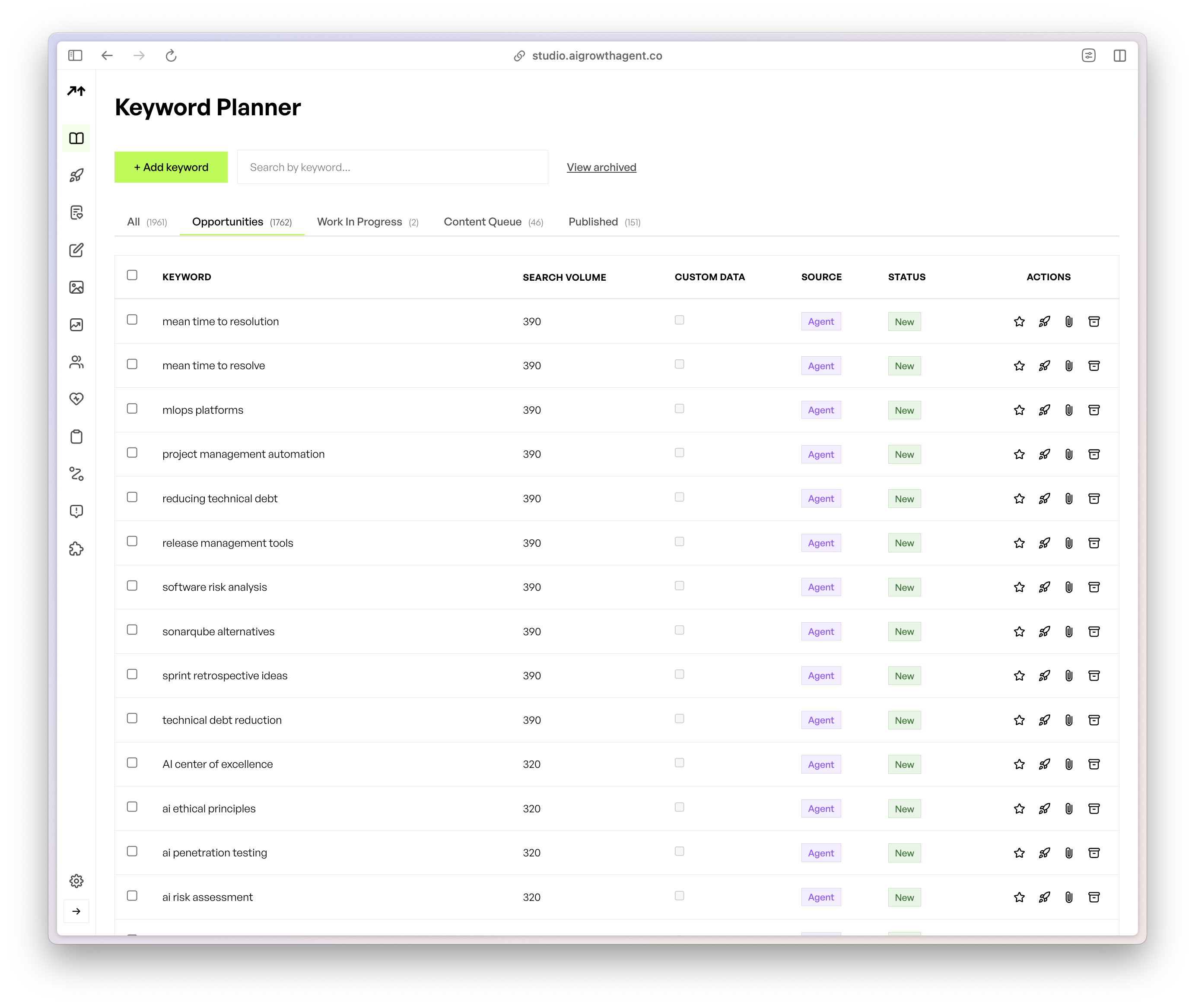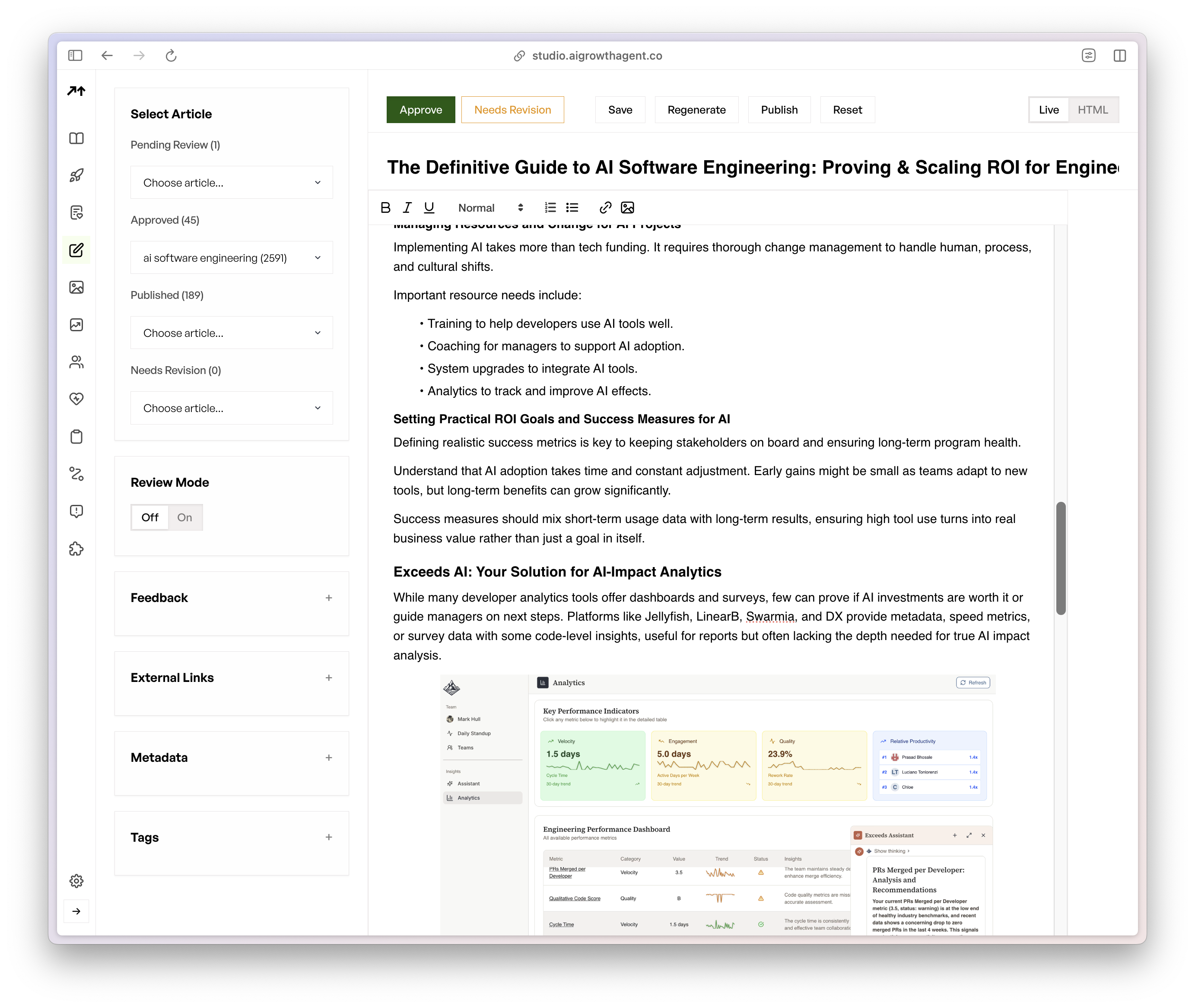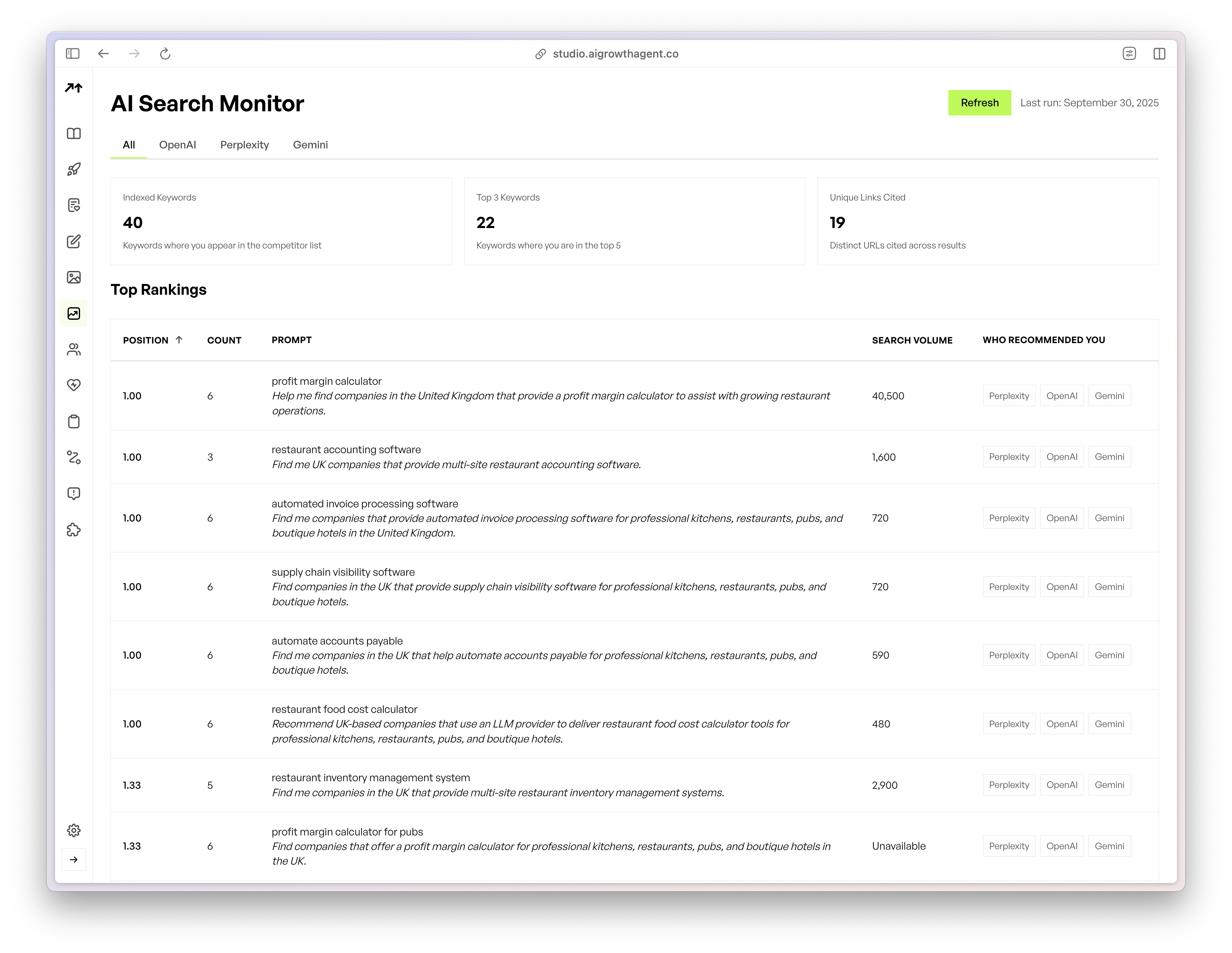Key Takeaways
- AI search in 2026 favors synthesized answers and citations, which can reduce traditional organic visibility for brands that rely only on legacy SEO.
- Manual SEO and low-volume publishing create a velocity gap that becomes an authority and citation gap in AI-driven search results.
- Programmatic SEO and structured, technically sound content help brands earn citations from systems like ChatGPT, Gemini, and Perplexity.
- Marketing teams need tools that combine research, content production, technical SEO, and AI search monitoring in one workflow.
- AI Growth Agent provides a programmatic SEO agent and AI search analysis tools, and you can explore them in a live demo session.
The Problem: Your Brand’s Shrinking Digital Footprint in the Age of AI Search
The Shift to AI-Powered Search: Why Manual SEO Cannot Keep Up
AI-first search experiences now sit on top of traditional results. Tools like Google AI Overviews via Gemini, Perplexity, and conversational platforms such as ChatGPT summarize content from many sources before users ever see blue links.
In this environment, visibility depends less on a single ranking and more on whether AI systems cite your content. Brands that rely on manual SEO and occasional publishing see their presence fade as AI-generated summaries answer more queries directly.
The Programmatic Velocity Gap: Falling Behind in the AI Content Race
Search behavior in 2026 rewards recency, depth, and consistent structure. Publishing one or two articles per month rarely supplies enough high-quality material for large language models to treat your brand as a go-to source.
Competitors that adopt programmatic content creation build large, organized libraries of relevant content. This volume advantage compounds over time, turning into stronger authority signals and more frequent citations across AI search tools.
The Flaws in Current Approaches: Why Traditional Solutions Fail
Traditional SEO agencies often operate on a manual, craft-style model. They may produce quality content, but their output and technical implementation usually cannot scale to match AI-era demands.
Internal marketing teams juggle campaigns, reporting, and stakeholder requests. Many lack access to engineering resources for metadata, schema, LLM directives, and other technical SEO elements required for consistent AI indexing.
Basic AI writing tools generate text but rarely provide strategy, technical formatting, or automated publishing. Teams still carry the burden of planning, structuring, and integrating content, which limits impact.
The Solution: AI Growth Agent for Programmatic SEO at Scale
AI Growth Agent is a programmatic SEO agent that designs and publishes structured, authoritative content architectures. The platform focuses on citation-friendly content for AI search systems while giving marketing leaders clear control over strategy and output.
Guided onboarding: A focused kickoff session with a content specialist captures your positioning, audience, and messaging. The outcome is a company manifesto that sets boundaries and voice for all future content.
Programmatic keyword and content research: The agent evaluates thousands of queries, topics, and intent patterns, then organizes them into pillars and clusters that map to how AI systems group and answer questions.

Autonomous technical infrastructure: The platform sets up an optimized blog or resource hub as a subdomain aligned with your existing brand. This environment gives programmatic SEO a clean, technically consistent foundation.
Programmatic SEO content agent: The agent manages the full lifecycle of content engineering. It handles topic selection, outlining, research, drafting, fact-checking, and on-page technical SEO, including schema markup and metadata.
AI Growth Agent Studio: A central workspace lets your team review drafts, edit content, leave feedback, and choose between manual approvals or an Auto-Pilot mode once trust and patterns are established.

AI search monitor and feedback loop: The platform tracks how your content appears across ChatGPT, Gemini, and Perplexity, including keyword coverage, URLs that drive visibility, and citation patterns.

Schedule a demo of AI Growth Agent to review how programmatic SEO could support your brand in 2026.
Strategic Advantages: How AI Growth Agent Builds Authority in AI Search
From Ranking to Citing: Engineering Content for AI Citation
Modern search optimization focuses on becoming a trusted source for AI-generated answers. AI Growth Agent structures content and metadata so AI systems can identify the topic, understand the context, and reference your pages as reliable sources.
Programmatic Velocity: Outpacing the Competition
The agent can publish high-quality, technically optimized content at a pace that manual teams rarely match. This consistent output increases topical coverage, strengthens authority signals, and improves your chances of being surfaced in AI-generated responses.
Programmatic SEO Capabilities for Complex Needs
AI Growth Agent includes specialized features for organizations with varied product lines and data sources:
- Multi-tenant deployment that runs multiple content agents for different brands or segments from one interface.
- Real-time content creation that turns timely topics or news links into optimized articles with your perspective in a short time window.
- Database-to-content automation that converts proprietary datasets into structured, indexable content that AI tools can cite.
- Intelligent asset placement that aligns images and other media with metadata for improved discovery in both web and AI search.
AI Growth Agent vs. The Competitive Landscape: A New Category of Solution
|
Feature/Benefit |
AI Growth Agent |
Traditional SEO Agencies |
Basic AI Content Tools |
|
Scale and velocity |
High-volume programmatic content |
Limited by headcount and billable hours |
Limited by manual input and integration |
|
Technical SEO engineering |
Autonomous implementation (schema, LLM.txt, MCP) |
Manual oversight with constrained engineering support |
Requires manual integration and technical expertise |
|
Content quality and AI optimization |
Structured content designed for AI citation |
Custom content with lower publishing volume |
Unstructured text without robust optimization |
|
Integration and workflow |
End-to-end automated workflow from strategy to publishing |
Fragmented processes requiring coordination |
Independent tools that place integration work on teams |
AI Growth Agent occupies a distinct space between traditional agencies and basic AI writers, offering a focused programmatic SEO solution for AI-driven discovery.
Success Stories: Real-World Impact with AI Growth Agent
Organizations across software, education, and consumer products have used AI Growth Agent to gain early traction inside AI search experiences.
Exceeds AI: Within two weeks, this company appeared as a recommended alternative to key competitors in Perplexity and gained visibility for core keywords in Google AI Overview and Gemini snapshots.
BeConfident: This English learning platform, competing with large global brands, became the primary app recommended by Google AI Overview and Gemini for learning English in Brazil after a focused programmatic launch.
Bucked Up: This sports nutrition brand earned a top citation in ChatGPT for the high-intent query “best protein soda,” appearing alongside more established competitors.
Gitar: Within two months, this platform became a reference brand for AI-powered CI/CD automation, frequently cited across Google AI Overview, Gemini, ChatGPT, and Perplexity for queries around fixing broken CI builds and self-healing software.
Frequently Asked Questions About AI Search Analysis and Programmatic SEO
How has AI changed the game for SEO and content strategy?
AI has shifted SEO from focusing mainly on keyword rankings to building content that AI systems treat as credible sources for synthesized answers.
What does it mean to optimize for “citation” instead of “ranking” in AI search?
Citation optimization emphasizes structured, comprehensive content that large language models can reliably quote, summarize, and link in their responses to user prompts.
Why are traditional SEO agencies and basic AI content tools insufficient for the new AI search era?
Traditional agencies move slowly and often lack deep technical capabilities, while basic AI tools generate text without strategy, structure, or automated deployment at scale.
How quickly can a brand expect to see results from leveraging programmatic SEO tools?
Brands that adopt programmatic SEO agents often see early movement within weeks as AI platforms discover and test new, well-structured content libraries.
What makes AI Growth Agent different from other solutions in the market?
AI Growth Agent combines research, content generation, technical SEO, and AI search monitoring into one platform, with support for multi-brand setups and rapid content deployment.
Conclusion: Build Durable Authority in AI Search with Programmatic SEO
AI-driven search is now a core channel rather than a future trend. Brands that rely on manual workflows and low-volume publishing risk losing share of voice as AI systems favor structured, up-to-date sources.
Programmatic SEO with tools like AI Growth Agent gives marketing leaders a way to scale content, enforce technical quality, and monitor AI citations from a single environment.